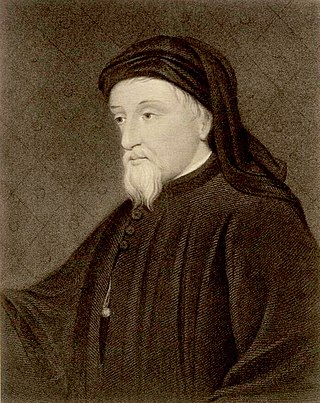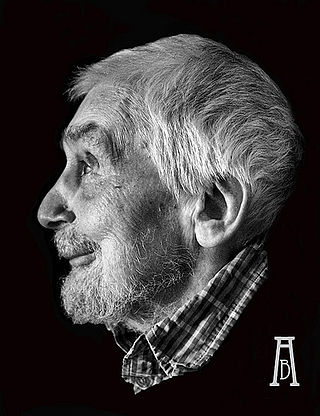A couplet is a pair of successive lines of metre in poetry. A couplet usually consists of two successive lines that rhyme and have the same metre. A couplet may be formal (closed) or run-on (open). In a formal couplet, each of the two lines is end-stopped, implying that there is a grammatical pause at the end of a line of verse. In a run-on couplet, the meaning of the first line continues to the second.

The Canterbury Tales is a collection of twenty-four stories that runs to over 17,000 lines written in Middle English by Geoffrey Chaucer between 1387 and 1400. It is widely regarded as Chaucer's magnum opus. The tales are presented as part of a story-telling contest by a group of pilgrims as they travel together from London to Canterbury to visit the shrine of Saint Thomas Becket at Canterbury Cathedral. The prize for this contest is a free meal at the Tabard Inn at Southwark on their return.

Geoffrey Chaucer was an English poet, author, and civil servant best known for The Canterbury Tales. He has been called the "father of English literature", or, alternatively, the "father of English poetry". He was the first writer to be buried in what has since come to be called Poets' Corner, in Westminster Abbey. Chaucer also gained fame as a philosopher and astronomer, composing the scientific A Treatise on the Astrolabe for his 10-year-old son Lewis. He maintained a career in the civil service as a bureaucrat, courtier, diplomat, and member of parliament.
A heroic couplet is a traditional form for English poetry, commonly used in epic and narrative poetry, and consisting of a rhyming pair of lines in iambic pentameter. Use of the heroic couplet was pioneered by Geoffrey Chaucer in the Legend of Good Women and the Canterbury Tales, and generally considered to have been perfected by John Dryden and Alexander Pope in the Restoration Age and early 18th century respectively.

John Gower was an English poet, a contemporary of William Langland and the Pearl Poet, and a personal friend of Geoffrey Chaucer. He is remembered primarily for three major works, the Mirour de l'Omme, Vox Clamantis, and Confessio Amantis, three long poems written in French, Latin, and English respectively, which are united by common moral and political themes.
Richard Mant was an English churchman who became a bishop in Ireland. He was a prolific writer, his major work being a History of the Church of Ireland.

Christopher Anstey was an English poet who also wrote in Latin. After a period managing his family's estates, he moved permanently to Bath and died after a long public life there. His poem, The New Bath Guide, brought him to fame and began an easy satirical fashion that was influential throughout the second half of the 18th century. Later he wrote An Electoral Ball, another burlesque of Bath society that allowed him to develop and update certain themes in his earlier work. Among his Latin writing were translations and summaries based on both these poems; he was also joint author of one of the earliest Latin translations of Gray's Elegy Written in a Country Churchyard, which went through several editions both in England and abroad.

"The Wife of Bath's Tale" is among the best-known of Geoffrey Chaucer's Canterbury Tales. It provides insight into the role of women in the Late Middle Ages and was probably of interest to Chaucer himself, for the character is one of his most developed ones, with her Prologue twice as long as her Tale. He also goes so far as to describe two sets of clothing for her in his General Prologue. She holds her own among the bickering pilgrims, and evidence in the manuscripts suggests that although she was first assigned a different, plainer tale—perhaps the one told by the Shipman—she received her present tale as her significance increased. She calls herself both Alyson and Alys in the prologue, but to confuse matters these are also the names of her 'gossib', whom she mentions several times, as well as many female characters throughout The Canterbury Tales.

Edwin George Morgan was a Scottish poet and translator associated with the Scottish Renaissance. He is widely recognised as one of the foremost Scottish poets of the 20th century. In 1999, Morgan was made the first Glasgow Poet Laureate. In 2004, he was named as the first Makar or National Poet for Scotland.

Troilus and Criseyde is an epic poem by Geoffrey Chaucer which re-tells in Middle English the tragic story of the lovers Troilus and Criseyde set against a backdrop of war during the siege of Troy. It was written in rime royale and probably completed during the mid-1380s. Many Chaucer scholars regard it as the poet's finest work. As a finished long poem it is more self-contained than the better known but ultimately unfinished The Canterbury Tales. This poem is often considered the source of the phrase: "all good things must come to an end" (3.615).

The General Prologue is the first part of The Canterbury Tales by Geoffrey Chaucer. It introduces the frame story, in which a group of pilgrims travelling to the shrine of Thomas Becket in Canterbury agree to take part in a storytelling competition, and describes the pilgrims themselves.

Thomas Hoccleve or Occleve was a key figure in 15th-century Middle English literature, significant for promoting Chaucer as "the father of English literature", and as a poet in his own right. His poetry, especially his longest work, the didactic work Regement of Princes, was extremely popular in the fifteenth century, but went largely ignored until the late twentieth century, when it was re-examined by scholars, particularly John Burrow. Today he is most well known for his Series, which includes the earliest autobiographical description of mental illness in English, and for his extensive scribal activity. Three holographs of his poetry have survived, and he also copied literary manuscripts by other writers. As a clerk of the Office of the Privy Seal, he wrote hundreds of documents in French and Latin.
Songes and Sonettes, usually called Tottel's Miscellany, was the first printed anthology of English poetry. First published by Richard Tottel in 1557 in London, it ran to many editions in the sixteenth century.

John Payne was an English poet and translator. Initially he pursued a legal career and had associated with Dante Gabriel Rossetti. Later he became involved with limited edition publishing and the Villon Society.
Michael Joseph Alexander is a British translator, poet, academic and broadcaster. He held the Berry Chair of English Literature at the University of St Andrews until his retirement in 2003. He is best known for his translations of Beowulf and other Anglo-Saxon poems into modern English verse.
Nationality words link to articles with information on the nation's poetry or literature.
Richard Polwhele was a Cornish clergyman, poet and historian of Cornwall and Devon.
An Eton Poetry Book is an anthology edited by Cyril Alington and George Lyttelton, with an introduction by A. C. Benson. The editors' intentions were "to provide poems which boys might reasonably be expected to like" and "to awaken their metrical sense." The book was published in 1925, with a second impression in 1927 and a third in 1938.
Siege of Thebes is a 4716-line poem written by John Lydgate between 1420 and 1422. Lydgate composed the Siege of Thebes directly following his composition of Troy Book - which was patronized by King Henry V - and directly preceding his production of The Fall of Princes - which Humphrey Duke of Gloucester patronized during King Henry VI's regency. The poem is particularly significant because it was written without an identifiable patron, and most probably without patron or commission whatsoever. Whatever the status of its patronage, the Siege of Thebes still managed to gain significant popularity, attested to by its 31 surviving manuscripts. The poem is, in large part, a response to Geoffrey Chaucer's The Canterbury Tales. Lydgate's poem borrows The Canterbury Tales' pilgrimage-based framing device and is written as an additional tale in the cycle. However, unlike Chaucer, Lydgate establishes himself as the narrator of the work, and recounts the siege of Thebes. Lydgate's Siege of Thebes follows and expands upon the Theban Cycle, but makes significant additions to the source materials.
Thomas Warwick was a poet and unbeneficed clergyman of Cornish origin, born about 1755, died after 1785. He took part in the revival of the sonnet form at the end of the 18th century and his other writing included odes and poems on mediaeval subjects. His behaviour was described as eccentric and he died early in a carriage accident.










